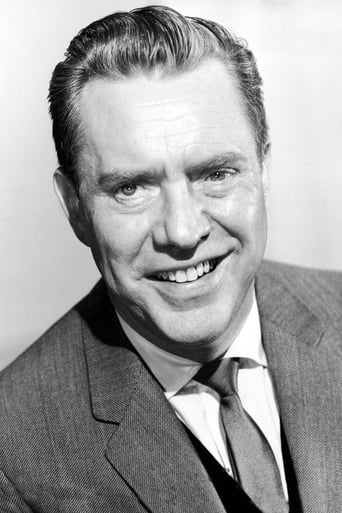Stometer
Save your money for something good and enjoyable
FuzzyTagz
If the ambition is to provide two hours of instantly forgettable, popcorn-munching escapism, it succeeds.
Deanna
There are moments in this movie where the great movie it could've been peek out... They're fleeting, here, but they're worth savoring, and they happen often enough to make it worth your while.
calvinnme
Here Fredric March plays criminal court judge Calvin Cooke who has a reputation as a sort of "hanging judge" so that he has earned the nickname of "old man Maximum". Edmond O'Brien plays a defense attorney arguing a case before the judge. While O'Brien's character looks at the spirit of the law, Judge Cooke looks only at the letter of it and it is obvious from the opening court scene that the two do not like each other. What do they have in common? They both love the judge's only daughter, Ellie.Now this doesn't mean that the judge is a bad guy. He likes his community, adores his wife of twenty years (Florence Eldridge as Catherine Cooke), and loves his daughter.But more trouble is afoot than just a suitor for his daughter's hand that the judge dislikes. His wife Catherine has been having headaches, dizziness, and has been dropping things due to numbness in her hands. She confides in a friend who also happens to be a doctor that she has "a friend" with these symptoms, and the doctor sees through her ruse and says that she should come to his Philadelphia office the next day for a check-up. She does that, but lies to Calvin and says she is going shopping.This is where I do some head scratching. The news is bad - Catherine has a type of inoperable brain tumor that means a certain and painful death. The doctor tells Catherine that everything is fine. Who does he call? After sticking a cancer stick in his mouth to relieve the stress (????) the good doctor calls Calvin, her husband and tells HIM the truth. They both decide to not tell Catherine, the ACTUAL patient, the truth. Later when Catherine finds out, she decides not to talk about it either, even though by the way she found out she must know that her husband knows. Why isn't anybody talking to anybody about this woman's illness? Everybody just goes on pretending. Maybe this is the way it was 60 years ago, and that is one reason I love classic film - it gives you real insight into a bygone era about how people handled life, in this case illness, the fact that doctors routinely smoked, that grown daughters lived at home and pretty much went from the custody of their fathers to their husbands, and that it was acceptable for a policeman to shoot a dog that had been run over by a car in plain view of the general public - a mercy killing. This last incident happens as the judge is walking down the street to get pain medicine for his wife that just isn't doing the job. The implication is that mercy killing is on the mind of "old man Maximum" too. How will all of this work out? Watch and find out.Even though all of the characters in this film are basically "good people" with good intentions, you could almost classify this one as a noir, because there are no easy answers, no possible way to a happy ending. I've seen a restored version of this film on Turner Classic Movies in the last year, so I wish Universal would find some way to get it out to the public. The questions the film raises are still relevant today. Highly recommended.
marcslope
Caught this tough 1948 drama on TCM, which seems to have been out of circulation for a while. It's about a tough, by-the-book judge (Fredric March) who discovers his wife (Florence Eldridge, March's real-life spouse) has a fatal, painful disease, and rather clumsily plots a mercy killing. This means that for much of the film's length we have to watch Eldridge suffer, suffer, and it's quite uncomfortable viewing. There are plot conveniences that one other poster lists, and also the debatable position posed by the family doctor (Stanley Ridges, also good) that Eldridge should be lied to about her prognosis. Hal Mohr's photography thrusts itself deep into the Marches' anguish, and plot and subplot are contrivedly merged when Edmond O'Brien, as the liberal attorney who's romancing the Marches' daughter (Geraldine Brooks), injects himself into March's murder trial. Then there's some unconvincing, unsolvable philosophizing about euthanasia, and fadeout. I find a number of faults: Daniel Amfitheatrof's hyperactive musical score, which needlessly underlines everything, and was there ever a less appealing juvenile than pudgy, charmless Edmond O'Brien? But the issues are real, the debate is tense, and Mr. and Mrs. March are superb. Now if only TCM would find a way to show their other excellent co-starring vehicle from back then, also Universal and also directed by Michael Gordon, "Another Part of the Forest."
blanche-2
Note: Today I went to hospice and said goodbye to a member of my family who has a brain tumor. So this movie resonated.Frederic March, Florence Eldredge, Geraldine Brooks, and Edmond O'Brien star in "Act of Murder," a 1948 film directed by Michael Gordon.March and Eldredge play a happily married couple, Judge Calvin and Catherine Cooke. They have a daughter (Brooks) engaged to an attorney (O'Brien) whose views are not the same as the Judge's.Catherine is suffering from severe headaches, so she sees a doctor. It turns out she is terminally ill. Apparently the practice in those days, in movies anyway, is not to tell the sick person that he or she is terminal. He does inform her husband.Catherine believes there is nothing wrong with her. The Judge decides to take her on a trip, a second honeymoon, during which she becomes violently ill and in intractable pain. When Calvin sees a wounded dog shot on a sidewalk so it wouldn't suffer, the wheels start turning.This is a story about euthanasia, a topic still hotly discussed today. Here is a man who loved his wife desperately, to the point where her pain was his as well. There's a story in Dirk Bogarde's biography about the horrible death his companion suffered; at one point, when he and another turned him during the night, his companion said, "If I were a dog, you wouldn't do this to me." It made Bogarde a proponent of euthanasia."Act of Murder" is a beautifully made movie, heart-wrenching and powerful, nominated for the Grand Prize at Cannes in 1948. The camera work by Hal Mohr is exceptional. As Catherine's and Calvin's world becomes darker and darker, we see it.Frederic March and his wife, Florence Eldredge are absolutely fantastic. They were the original stars on Broadway of Long Day's Journey into Night, and they must have been wonderful. An interesting play, like Streetcar, the focus can shift from the man to the woman, depending on the director and actors.See March and Eldredge in this film.
Lou Rugani
This film's relentless plotline marches straight-ahead forward as you squirm, fascinated, in your chair. The story is the familiar one about the onset of terminal illness within a solid American family of the 1940s. Never mind that it delves into MGM-style sermonizing; the great real-life husband/wife team of Fredric March and Florence Eldridge portray the couple whose once-comfortable lives are now being separated by an unstoppable and fast-advancing disease. The helpless husband, the uncomplaining wife, and their final attempt to recapture happier days with a doomed weekend outing is the stuff of deep film drama indeed. The sense of onrushing darkness is tangible through the film-noir camera shadings of Hal Mohr (Captain Blood, Phantom of the Opera [1943], The Climax), and Daniele Amfitheatrof's rich musical score. "An Act of Murder" makes a profound statement on the value, and the fragility, of life.




